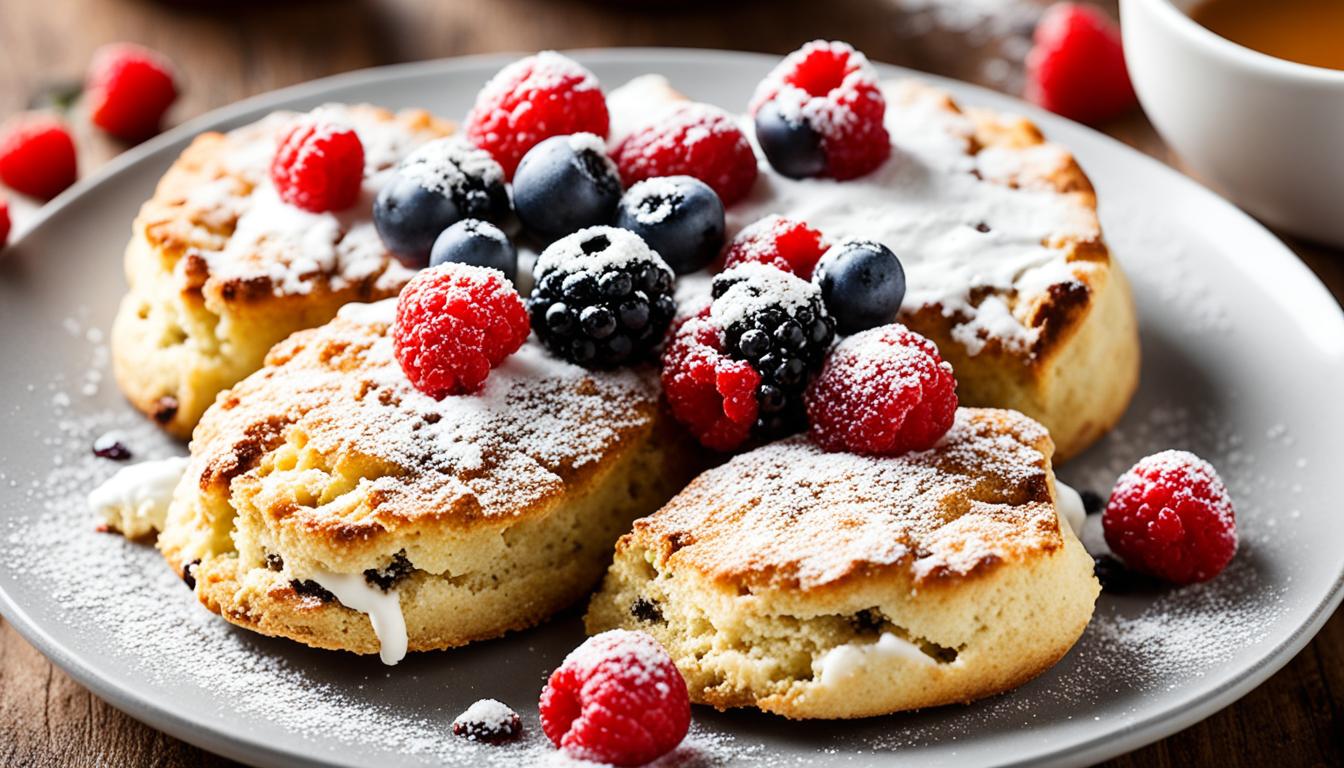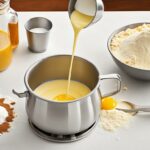Originally posted on April 6, 2024 @ 7:09 am
Did you know that you can make delicious scones without eggs? Many traditional scone recipes call for eggs as one of the main ingredients, but there are plenty of egg-free alternatives that are just as scrumptious. Whether you follow a vegan lifestyle or have an egg allergy, exploring eggless scone recipes opens up a world of possibilities for delightful treats. Let’s dive into the world of eggless scones and discover how to create these delectable delights without eggs.
Contents
- 1 The Versatility of Scones
- 2 Reasons to Make Eggless Scones
- 3 Eggless Scone Recipe Basics
- 4 Eggless Scone Recipe Variations
- 5 Tips for Making Eggless Scones
- 6 The Texture of Eggless Scones
- 7 Freezing and Storing Scones
- 8 Half-Size Scone Option
- 9 Recipe for Eggless Scones
- 10 Conclusion
- 11 FAQ
- 11.1 Do scone recipes need eggs?
- 11.2 Can I make scones without eggs?
- 11.3 How can I make scones without eggs?
- 11.4 What are the best eggless scone recipes?
- 11.5 Can I make vegan scones without eggs?
- 11.6 How do I substitute eggs in scone recipes?
- 11.7 Are eggless scones dry or crumbly?
- 11.8 How should I store scones?
- 11.9 Can I make smaller scones?
- 11.10 What is a basic recipe for eggless scones?
- 11.11 Are eggless scones as delicious as traditional scones?
- 12 Source Links
Key Takeaways:
- Scone recipes can be made without eggs, making them suitable for vegans and those with egg allergies.
- Substituting eggs with ingredients like heavy cream, buttermilk, or alternative binders can help create a moist and tender texture in eggless scones.
- There is a wide variety of flavors and add-ins you can experiment with when making eggless scones.
- Proper measuring, using cold butter, and kneading the dough lightly are essential for achieving the perfect texture in eggless scones.
- Eggless scones can be stored, frozen, and enjoyed later for ultimate convenience.
The Versatility of Scones
Scones are a versatile treat that can be enjoyed in various forms, whether you prefer them with or without eggs. While many traditional scone recipes call for eggs as a binding agent, there are plenty of alternatives that produce equally delicious results. By substituting eggs with other ingredients or using alternative binding agents, you can create scones that are just as flavorful and satisfying as their eggy counterparts.
There are numerous reasons why you might choose to make scones without eggs. It could be due to personal preference, dietary restrictions, or the desire to explore new flavors and textures. Regardless of the reason, it’s important to understand the different options available when it comes to making eggless scones. Not only will this broaden your culinary skills, but it will also allow you to cater to a wider range of dietary preferences.
When it comes to making scones without eggs, there are several substitutes and techniques you can try. Heavy cream or buttermilk can be used as a binding agent in place of eggs, ensuring the dough holds together and achieves the desired texture. You can also experiment with alternative binders such as flaxseed meal or applesauce, which provide moisture and help bind the ingredients together.
Substituting eggs in scone recipes opens up a world of possibilities. From fruit-packed scones bursting with berries to decadent chocolate chip scones that satisfy your sweet tooth, there is a flavor combination to suit every taste. Let your creativity run wild and experiment with different ingredients to discover your favorite eggless scone recipe.
“Scones are incredibly versatile and can be made with or without eggs. By substituting eggs with other ingredients, you can create scones that are just as flavorful and satisfying as their eggy counterparts.”
Scone Recipes with and without Eggs
To showcase the versatility of scones and provide some inspiration, here is a comparison of two scone recipes: one with eggs and one without.
| Egg-based Scone Recipe | Eggless Scone Recipe |
|---|---|
| Ingredients: | Ingredients: |
| – 2 cups all-purpose flour | – 2 cups all-purpose flour |
| – 1/4 cup sugar | – 1/4 cup sugar |
| – 1 tablespoon baking powder | – 1 tablespoon baking powder |
| – 1/2 teaspoon salt | – 1/2 teaspoon salt |
| – 1/2 cup unsalted butter, cold | – 1/2 cup unsalted butter, cold |
| – 1 large egg | – 1/2 cup heavy cream or buttermilk |
| – 1/2 cup milk | – 1/4 cup sugar |
| – 1 teaspoon vanilla extract | – 1 tablespoon baking powder |
| Instructions: | Instructions: |
| – Preheat the oven to 425°F. | – Preheat the oven to 425°F. |
| – In a large bowl, mix the flour, sugar, baking powder, and salt. | – In a large bowl, mix the flour, sugar, baking powder, and salt. |
| – Add the cold butter and use a pastry cutter to incorporate it into the dry ingredients until the mixture resembles coarse crumbs. | – Add the cold butter and use a pastry cutter to incorporate it into the dry ingredients until the mixture resembles coarse crumbs. |
| – In a separate bowl, whisk the egg, milk, and vanilla extract together. | – In a separate bowl, whisk the heavy cream or buttermilk and sugar together. |
| – Pour the wet ingredients into the dry ingredients and stir until just combined. | – Pour the wet ingredients into the dry ingredients and stir until just combined. |
| – Turn the dough out onto a lightly floured surface and knead it gently a few times until it comes together. | – Turn the dough out onto a lightly floured surface and knead it gently a few times until it comes together. |
| – Pat the dough into a 1-inch thick round and cut it into wedges. | – Pat the dough into a 1-inch thick round and cut it into wedges. |
| – Transfer the wedges to a baking sheet lined with parchment paper. | – Transfer the wedges to a baking sheet lined with parchment paper. |
| – Bake for 12-15 minutes or until golden brown. | – Bake for 12-15 minutes or until golden brown. |
As you can see, both recipes produce delicious scones, but the eggless version simply omits the eggs and uses heavy cream or buttermilk as a substitute. This alternative ensures that the scones maintain their desirable texture and taste, even without the eggs.
Experiment with different ingredients and techniques to find the perfect eggless scone recipe that suits your taste preferences and dietary needs. Whether you choose scones with eggs or without, there’s no denying the versatility and scrumptiousness of these delightful baked treats.
Reasons to Make Eggless Scones
There are several compelling reasons why you should consider making eggless scones. Whether you follow a vegan lifestyle, have egg allergies, or simply want to try something different, these scones offer a delicious and satisfying alternative. Let’s explore the reasons why you might want to give them a try.
Perfect for a Vegan Lifestyle
If you follow a vegan diet, finding delicious baked goods that align with your dietary preferences can sometimes be challenging. Luckily, eggless scones are an excellent option for vegans. By eliminating eggs, these scones are entirely plant-based, making them a delightful treat that doesn’t compromise your dietary choices. You can enjoy the flavors and textures of scones without any animal products.
Great for Individuals with Egg Allergies or Dietary Restrictions
Egg allergies can make enjoying traditional scones difficult. Eggs are a common allergen, and many people must avoid them to prevent adverse reactions. Eggless scone recipes provide a safe and tasty alternative for individuals with egg allergies. These recipes allow you to indulge in scones without worrying about allergic reactions or compromising your health.
Moreover, eggless scones are also suitable for individuals with dietary restrictions that exclude eggs. Whether you’re following a specific eating plan or have dietary guidelines that prohibit eggs, these scones offer a delicious solution that meets your dietary needs.
A Convenient Option When You’re Out of Eggs
Have you ever started baking a batch of scones, only to realize you’re out of eggs? It’s a frustrating situation that can bring your cooking plans to a halt. However, with eggless scone recipes, you can still proceed and create a delicious batch of scones without the need for eggs. These recipes provide alternative ingredients and techniques to achieve the perfect texture and taste, even without eggs.
Supporting the Environment and Animal Welfare
By choosing to make eggless scones, you’re also making a positive impact on the environment and animal welfare. Egg production can have significant ecological and ethical implications. By opting for eggless recipes, you are reducing your environmental footprint and contributing to a more sustainable food system. This choice aligns with the values of many individuals who prioritize ethical consumption and want to make a difference.
Whether you’re a vegan, have egg allergies, or simply want to explore new flavors, eggless scones offer a delightful alternative. They are easy to make, tasty, and cater to different dietary needs and preferences. Next, let’s dive into the basics of making eggless scones and discover some fantastic recipes.
Eggless Scone Recipe Basics
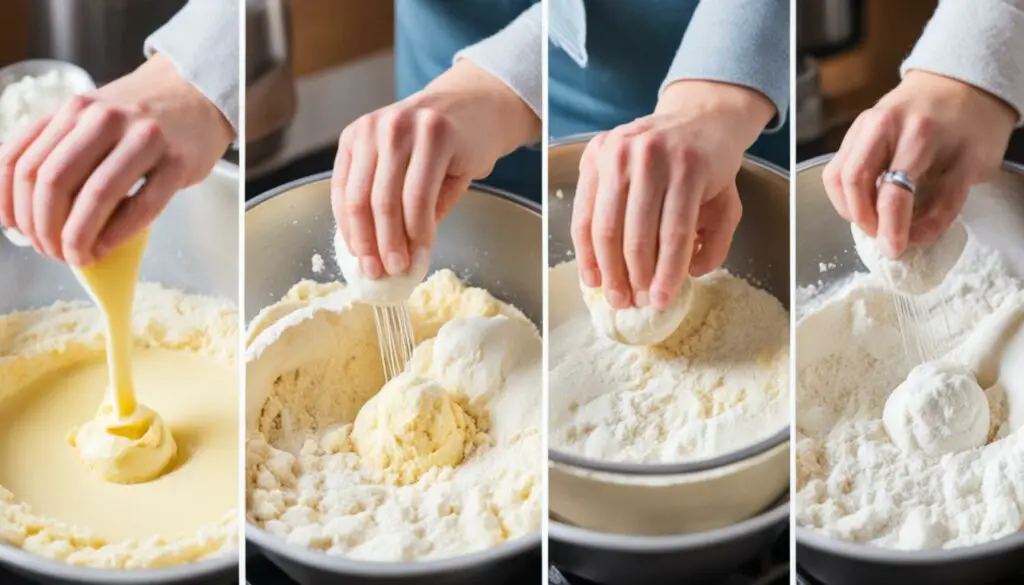
When it comes to making eggless scones, there are a few basic substitutes and techniques that can help you achieve delicious results. By using alternative ingredients as binding agents and adopting proper techniques, you can create scones that are just as moist and flavorful as their egg-containing counterparts.
Instead of relying on eggs, you have several options for achieving the desired texture and consistency. Ingredients like heavy cream or buttermilk can serve as excellent substitutes for eggs, providing moisture and richness to the scones. Alternatively, you can use alternative binders such as flaxseed meal or applesauce to help bind the ingredients together.
When making eggless scones, using cold butter is crucial. Cold butter helps create pockets of steam during the baking process, resulting in a flaky texture. It’s also important to measure the flour accurately to avoid a dry or crumbly texture. Adding too much flour can make the scones dense, while too little can make them overly moist and soft.
Tips for Making Eggless Scones:
- Use alternative binders such as flaxseed meal or applesauce to replace eggs.
- Substitute heavy cream or buttermilk for moisture and richness.
- Use cold butter to create a flaky texture.
- Measure flour accurately to achieve the perfect consistency.
By following these basic tips and techniques, you can confidently create delicious eggless scones that will wow your family and friends. Experiment with different flavors and add-ins to customize your scones and make them truly unforgettable.
Up next, we’ll explore a variety of eggless scone recipes that you can try at home. From classic flavors to unique combinations, there’s a recipe for everyone’s taste buds. Get ready to be inspired and start baking!
Eggless Scone Recipe Variations
One of the best things about making eggless scones is the endless variety of flavors and add-ins you can incorporate. From classic favorites like blueberry and chocolate chip to more unique combinations like cranberry orange or lavender white chocolate, there is a flavor for everyone. You can get creative and customize your scones with your favorite ingredients to make them truly unique and delicious.
Classic Blueberry Scones
For a classic twist, try adding fresh blueberries to your eggless scone recipe. The burst of juicy sweetness pairs perfectly with the buttery crumb of the scones. Serve them warm with a drizzle of glaze or a dollop of clotted cream for a delightful treat.
Decadent Chocolate Chip Scones
If you’re a fan of chocolate, why not indulge in some chocolate chip scones? The rich, melty chocolate chips take the scones to a whole new level of deliciousness. These scones are perfect for chocolate lovers and can be enjoyed for breakfast or as an afternoon snack.
Unique Flavor Combinations
If you’re feeling adventurous, you can experiment with unique flavor combinations in your eggless scone recipes. Try adding dried cranberries and orange zest for a tangy twist, or mix in some culinary lavender and white chocolate for a floral and sweet flavor profile. The possibilities are endless!
Get creative with your ingredients and let your taste buds guide you. Whether you prefer fruity, chocolatey, or more adventurous flavors, there’s a scone variation out there that will satisfy your cravings. Don’t be afraid to mix and match different ingredients to create your own signature scone recipe.
Once you’ve chosen your flavor combination, follow the basic scone recipe while incorporating your unique additions. The result will be a batch of delectable egg-free scones that are sure to impress your family, friends, or anyone lucky enough to enjoy them.
Tips for Making Eggless Scones
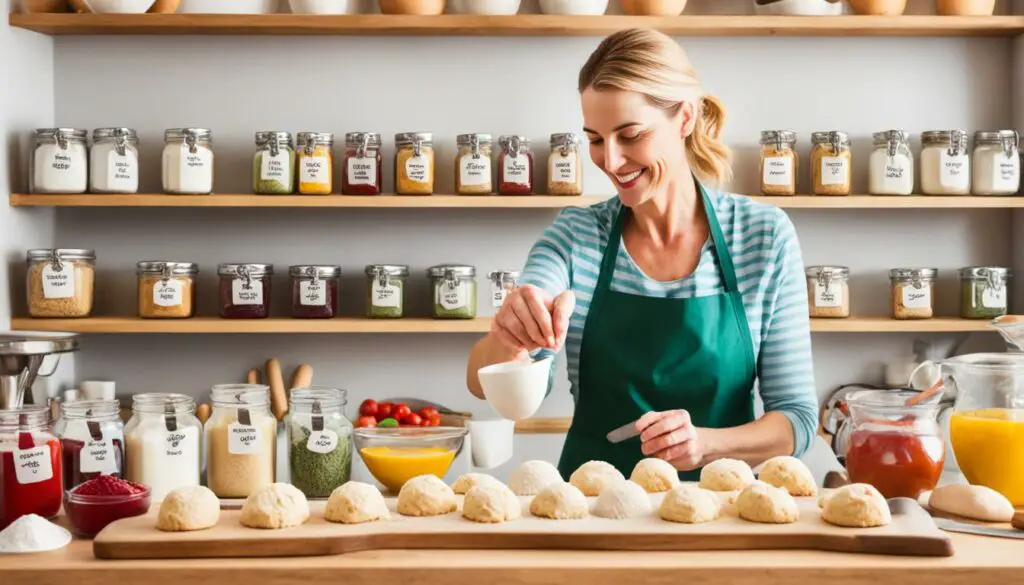
When it comes to making eggless scones, there are a few tips and tricks that can help ensure the best results. By following these guidelines, you can create delicious, tender scones that are free from eggs. Let’s dive into some handy tips for making eggless scones that are sure to impress!
1. Measure Flour Accurately
Accurate measurement of flour is crucial when making scones without eggs. Too much flour can make the scones dense and dry, while too little can result in a crumbly texture. Use a kitchen scale or a measuring cup to measure the flour accurately, following the recipe’s instructions.
2. Use Cold Butter
Cold butter is essential for achieving the perfect scone texture. The cold butter creates small pockets of steam when baked, resulting in a flaky and tender scone. Cut the butter into small cubes and keep it chilled until ready to use. Incorporate the cold butter into the dry ingredients using a pastry cutter or your fingertips until the mixture resembles coarse crumbs.
3. Knead the Dough Lightly
When working with scone dough, it’s important to handle it lightly to avoid overmixing. Overmixing can lead to tough and dense scones. Gently knead the dough until it just comes together, being careful not to overwork it. This will help ensure a tender and light texture in the finished scones.
4. Freeze the Scones Before Baking
Freezing the scones before baking can help them maintain their shape and rise properly in the oven. After shaping the scones, place them on a baking sheet lined with parchment paper and transfer them to the freezer for about 15-30 minutes. This step allows the butter to firm up and ensures a flaky texture when baked.
By incorporating these tips into your eggless scone baking routine, you’ll be on your way to creating scones that are just as delicious and satisfying as their egg-containing counterparts. Don’t hesitate to experiment with different flavors, add-ins, and glazes to personalize your eggless scones and make them your own!
The Texture of Eggless Scones
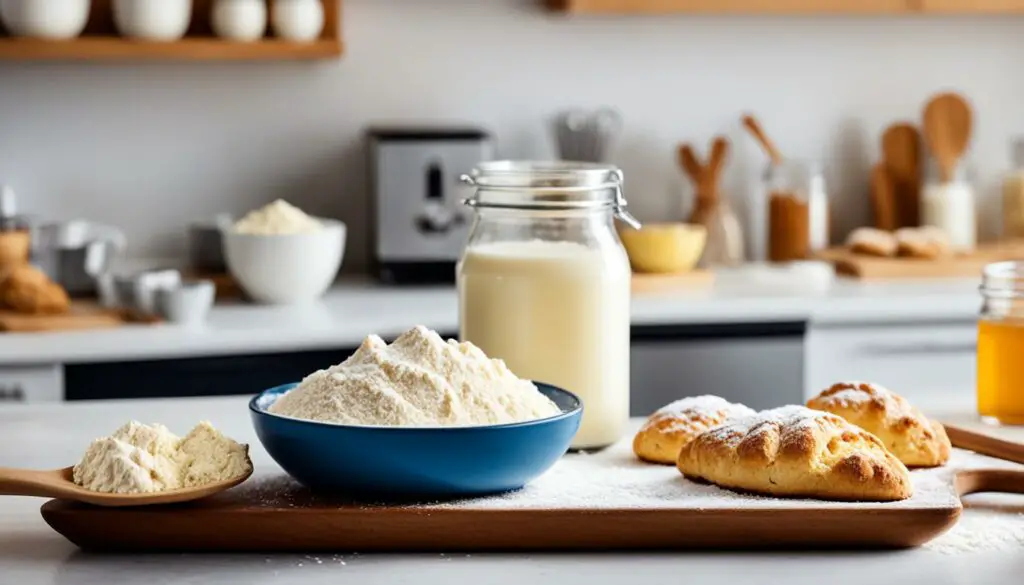
Many people believe that eggless scones will inevitably be dry or crumbly. However, this is far from the truth! With the right ingredients and techniques, you can achieve a moist and tender texture that rivals any scone made with eggs.
When making eggless scones, it’s crucial to incorporate ingredients that add moisture and richness to the dough. Heavy cream and butter work wonders in creating a soft and delectable texture. Alternatives like vegan butter or non-dairy milk can be used for those following a plant-based diet.
Another key aspect is using alternative binders. Ingredients like flaxseed meal or applesauce act as remarkable substitutes for eggs, keeping the scones tender and moist. These binders also provide structure and prevent the scones from falling apart.
To ensure the perfect texture, it’s important to follow a well-balanced recipe that combines the right ratio of wet and dry ingredients. By measuring flour accurately and using the appropriate amount of liquid, you can achieve the ideal consistency for your eggless scones.
“Making eggless scones doesn’t mean compromising on texture. By using ingredients that add moisture, richness, and alternative binders, you can create scones that are anything but dry!”
By incorporating these tips and techniques, you’ll be able to bake eggless scones that are just as delightful as their traditional counterparts. The moist and tender texture will impress even the biggest skeptics. So, go ahead and give these easy scone recipes without eggs a try!
| Eggless Scone Texture Tips | Description |
|---|---|
| Use ingredients that add moisture | Incorporate heavy cream, butter, or alternative binders like flaxseed meal or applesauce. |
| Follow a well-balanced recipe | Measure flour accurately and use the right amount of liquid for the perfect dough consistency. |
| Combine wet and dry ingredients correctly | Ensure all ingredients are fully incorporated, but avoid overmixing to prevent tough scones. |
| Don’t be afraid to experiment | Customize your scones with add-ins like fruits, nuts, or spices to enhance both flavor and texture. |
With these handy tips and a reliable recipe, you’ll be well on your way to creating the best eggless scones. The combination of moisture, alternative binders, and proper technique will result in scones that are moist, fluffy, and utterly irresistible.
Check out this comprehensive guide on scone dough dos and don’ts for more valuable tips and insights to master the art of making the perfect scone texture.
Freezing and Storing Scones
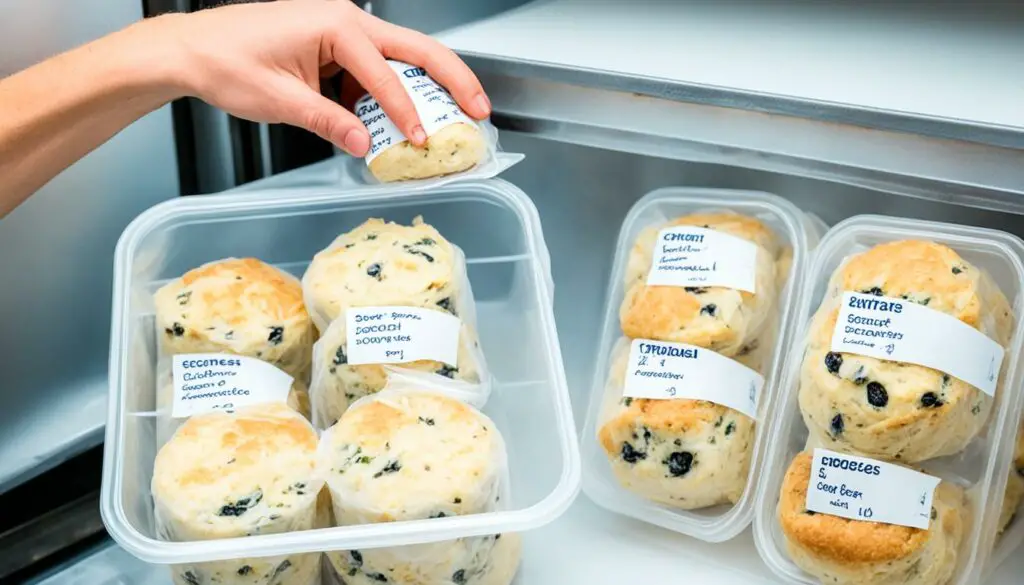
Once you’ve baked a batch of delicious scones, you may find yourself with leftovers or want to save some for later. The good news is that scones can be easily stored and enjoyed at a later time. Here are some tips on how to store scones and keep them fresh for as long as possible.
Storing at Room Temperature
One option for storing scones is to keep them at room temperature in an airtight container. This is ideal for scones that will be consumed within the next two days. To store scones this way, simply place them in a container with a tight-fitting lid or wrap them tightly in plastic wrap. This method will help maintain the scones’ texture and prevent them from drying out.
Refrigerating Scones
If you want to extend the shelf life of your scones, you can store them in the refrigerator. Refrigeration helps keep the scones fresh for up to a week. To refrigerate scones, place them in an airtight container or sealable bag and store in the fridge. Before consuming, you can warm them up slightly in the oven or microwave for a few seconds to restore their freshness.
Freezing Scones
To store scones for an extended period, freezing is the best option. Freezing not only preserves the scones but also allows you to have freshly baked scones whenever you crave them. Here’s how to freeze scones:
- Allow the scones to cool completely before freezing.
- Individually wrap each scone tightly in plastic wrap or place them in a freezer bag.
- Label the bag or wrap with the date to keep track of the storage time.
- Place the wrapped scones in the freezer and freeze for up to 3 months.
When you’re ready to enjoy the frozen scones, there are a few different methods for thawing and heating them:
- Thawing at room temperature: Remove the scones from the freezer and let them thaw at room temperature for a couple of hours. Once thawed, you can enjoy them as-is or warm them up in the oven for a few minutes.
- Thawing in the refrigerator: If you prefer a slower thawing process, you can place the frozen scones in the refrigerator overnight. This method allows the scones to thaw gradually, ensuring the best texture.
- Reheating in the oven: To restore the scones’ flaky texture and warm them thoroughly, preheat your oven to 350°F (175°C). Place the thawed scones on a baking sheet and heat for about 5-10 minutes until warmed through.
- Reheating in the microwave: If you’re in a hurry, you can use the microwave to thaw and warm the scones. Place a single scone on a microwave-safe plate and heat on high for 20-30 seconds or until warmed through.
By freezing your scones, you can always have a supply on hand for breakfast, tea time, or a quick snack. Whether you freeze them before baking or after, the process helps firm up the butter and creates a flakier texture.
Half-Size Scone Option
If you prefer smaller scones, you can easily make a half-size batch by cutting the wedges in half. These half-sized scones require less baking time but still offer the same delicious flavors and textures. Simply adjust the baking time accordingly to ensure they are baked to perfection.
Tips for Making Half-Size Scones:
- Use a sharp knife or a pastry cutter to cut the scone dough into smaller wedges. It’s helpful to lightly flour the knife or cutter to prevent sticking.
- Reduce the oven temperature by 25 degrees Fahrenheit when baking half-sized scones to ensure they are cooked evenly.
- Keep a close eye on the baking time, as the smaller scones may cook faster than their full-sized counterparts. Start checking for doneness a few minutes earlier than the original recipe suggests.
- Once out of the oven, allow the half-sized scones to cool slightly before serving. This helps them firm up and ensures they hold their shape.
Experiment with different flavors and add-ins for your half-sized scones. Whether you prefer classic options like dried fruit or chocolate chips, or more creative combinations like savory cheese and herbs, the possibilities are endless. Get creative and customize your mini scones to match your taste preferences.
Enjoy these bite-sized treats as a delightful addition to brunch, afternoon tea, or as a special treat any time of the day. Let your imagination run wild and savor the scrumptiousness of these half-sized scones without compromising on taste or texture.
Recipe for Eggless Scones
Looking for a delicious and easy scone recipe that doesn’t require eggs? Look no further! These eggless scones are light, tender, and packed with flavor. Whether you’re following a vegan lifestyle or have an egg allergy, these scones are the perfect treat. Follow the recipe below to create the best eggless scones:
Ingredients:
- 2 cups all-purpose flour
- 1/4 cup granulated sugar
- 1 tablespoon baking powder
- 1/2 teaspoon salt
- 1/2 cup cold unsalted butter, cubed
- 3/4 cup buttermilk
- 1 teaspoon vanilla extract
Instructions:
- Preheat your oven to 425°F (220°C). Line a baking sheet with parchment paper and set aside.
- In a large mixing bowl, whisk together the flour, sugar, baking powder, and salt.
- Add the cubed cold butter to the dry ingredients. Using a pastry cutter or your fingers, cut the butter into the flour mixture until it resembles coarse crumbs.
- In a separate bowl, combine the buttermilk and vanilla extract.
- Pour the buttermilk mixture into the dry ingredients and gently mix until just combined. Be careful not to overmix.
- Transfer the dough onto a lightly floured surface. Gently knead the dough a few times until it comes together.
- Shape the dough into a circle with a thickness of approximately 1 inch. Cut the circle into 8 wedges.
- Place the scones onto the prepared baking sheet, leaving some space between each wedge.
- Bake for 12-15 minutes, or until the scones are golden brown.
- Remove from the oven and allow the scones to cool for a few minutes before enjoying.
These eggless scones are best served warm and can be enjoyed plain or topped with your favorite jam, butter, or clotted cream. They make a wonderful addition to any breakfast or afternoon tea. Give this recipe a try and discover how easy it is to make delicious eggless scones!
Conclusion
Making scones without eggs is not only possible, but it opens up a whole new world of flavors and possibilities. Whether you follow a vegan diet, have an egg allergy, or simply want to try something different, egg-free scone recipes are a delicious and satisfying option.
By using the right techniques and substitutions, you can create moist, tender, and flavorful scones that will delight your taste buds. From classic flavors like blueberry and chocolate chip to more unique combinations like cranberry orange or lavender white chocolate, there is an eggless scone recipe for everyone.
Don’t let the absence of eggs stop you from enjoying these delectable treats. Dive into the world of egg-free scones and discover how easy it is to make them. Whether you’re serving them for breakfast, with a cup of tea, or as an afternoon snack, these scones will be a hit with family and friends. So go ahead, explore the possibilities and indulge in the deliciousness of eggless scones!
FAQ
Do scone recipes need eggs?
Many traditional scone recipes call for eggs, but it is possible to make delicious scones without them. There are various substitutions and techniques you can use to create eggless scones.
Can I make scones without eggs?
Yes, you can make scones without eggs. There are several eggless scone recipes available that use alternative binding agents or ingredients to achieve the desired texture and flavor.
How can I make scones without eggs?
You can make scones without eggs by using ingredients like heavy cream, buttermilk, flaxseed meal, or applesauce as substitutes. These ingredients help provide moisture and binding in the absence of eggs.
What are the best eggless scone recipes?
There are many delicious eggless scone recipes available. Some popular options include blueberry scones, chocolate chip scones, cranberry orange scones, and lavender white chocolate scones. The possibilities are endless!
Can I make vegan scones without eggs?
Yes, you can make vegan scones without eggs. Vegan scone recipes typically use plant-based ingredients and substitutions to achieve the desired texture and taste.
How do I substitute eggs in scone recipes?
Instead of eggs, you can use ingredients like heavy cream, buttermilk, flaxseed meal mixed with water, or applesauce to substitute for binding agents. These ingredients help create a tender and moist texture in the scones.
Are eggless scones dry or crumbly?
Eggless scones can be moist and tender if made properly. By using ingredients like heavy cream, butter, or alternative binders and following the right techniques, you can achieve a moist and delicious texture.
How should I store scones?
Once baked, you can store scones at room temperature in an airtight container for up to 2 days. They can also be stored in the refrigerator for up to a week or frozen for up to 3 months.
Can I make smaller scones?
Yes, you can make smaller scones by cutting the wedges in half. These half-sized scones require less baking time but still offer the same delicious flavors and textures.
What is a basic recipe for eggless scones?
Here is a basic recipe for eggless scones:
– Ingredients: all-purpose flour, sugar, baking powder, salt, cold butter, milk (or alternative like heavy cream or buttermilk), and the flavorings or add-ins of your choice.
– Instructions: Combine dry ingredients, cut in cold butter, add liquid gradually, mix until dough forms, shape dough into a circle or rectangle, cut into wedges, and bake in a preheated oven until golden brown.
Are eggless scones as delicious as traditional scones?
Yes, eggless scones can be just as delicious as traditional scones if made with the right ingredients and techniques. Experimenting with different flavors, add-ins, and techniques can result in scones that are flavorful and satisfying.

